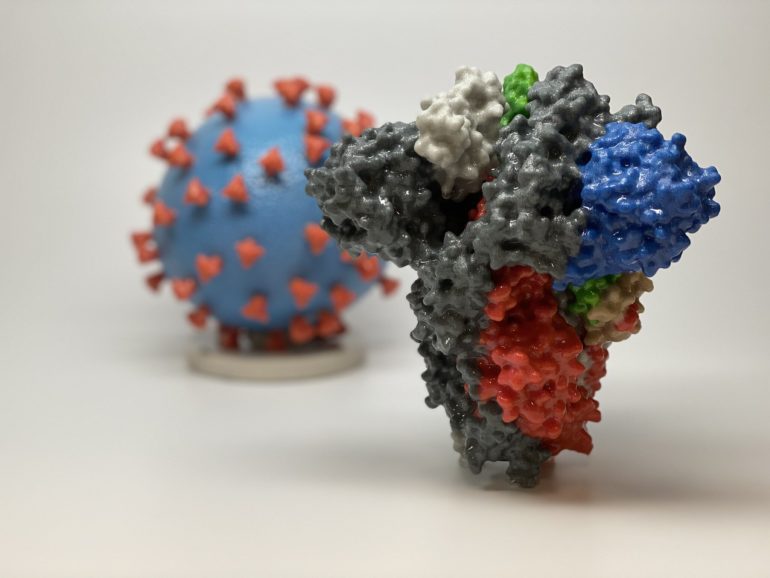Researchers at Vanderbilt University Medical Center have found that people recovering from COVID-19 and those vaccinated against the causative virus, SARS-CoV-2, produce identical clones, or groups, of antibody-producing white blood cells.
Their discovery, reported this week in the journal Cell Reports, sheds light on the selection pressures driving the emergence of SARS-CoV-2 variants that have the potential to escape from naturally occurring antibodies and those induced by vaccination.
Current vaccines, including those that use genetic material, mRNA, encoding a viral protein to elicit an immune response, are largely protective against the delta variant now sweeping through unvaccinated populations around the world. Yet scientists worry other variants may emerge that are more virulent and transmissible—even among those already vaccinated.
The findings reported this week could help scientists design more effective vaccines and antibody therapies against a broader range of variants, the researchers concluded.
“We were surprised to discover that there are so many shared antibodies between individuals after SARS-CoV-2 infection, but that is a good sign,” said the paper’s corresponding author, James Crowe Jr., MD, director of the Vanderbilt Vaccine Center.
“It was encouraging to find that an mRNA vaccine also induces those clones, which in part explains why these antibodies work so well in so many people,” said Crowe, who holds the Ann Scott Carell Chair and is professor of Pediatrics and Pathology, Microbiology & Immunology at VUMC.
Antibodies are proteins produced by specialized white blood cells called B lymphocytes, or B cells. When a virus binds to the surface of a B cell, it stimulates the cell to divide and mature into a clone of identical cells.
The mature B cells, called plasma cells, secrete millions of antibodies into the bloodstream and lymphatic system, some of which attach to the virus and prevent it from infecting its target cell.
The researchers identified 27 public clonotypes, genetically similar clones of antibodies, which were shared by COVID-19 survivors and by uninfected people who had been vaccinated against SARS-CoV-2.
Most of the public clonotypes were formed against part of the viral surface “spike” or S protein that attaches to a specific receptor on the surface of cells in the lungs and other tissues.
This part of the S protein is variable, meaning that it can change, or mutate, in ways that can make the virus virtually invisible to circulating antibodies.
If many people independently make the same antibody against the variable part of the S protein, this may exert selective pressure on it to mutate.
Scientists believe this is what led to the delta variant of SARS-CoV-2, which is more infectious than the original strain of the virus, and much more transmissible from person to person.
In this study, researchers for the first time found two public clonotypes recognizing another, more conserved part of the S protein that fuses with the cell membrane. Once fusion occurs, SARS-CoV-2 enters its target cell, where it hijacks the cell’s genetic machinery to copy itself.
Neutralizing antibodies that bind the conserved part of the S protein are of interest because this part of the protein is less likely to mutate.
Variants of SARS-CoV-2 may be less likely to evade vaccines and antibody therapies when its less mutable “Achilles heel” is targeted.
The research was conducted in collaboration with colleagues at Washington University School of Medicine in St. Louis, the University of Arizona College of Medicine in Tucson, and Integral Molecular Inc. in Philadelphia.
Elaine Chen, a graduate student in the Crowe lab, was the paper’s first author. Other VUMC co-authors were Pavlo Gilchuk, Ph.D., Seth Zost, Ph.D., Naveen Suryadevara, Ph.D., Elad Binshtein, Ph.D., Rachel Sutton, Jessica Rodriguez, Sam Day, Luke Myers, Andrew Trivette, MS, and Robert Carnahan, Ph.D.
New ‘atlas’ charts how antibodies attack spike protein variants
More information:
Elaine C. Chen et al, Convergent antibody responses to the SARS-CoV-2 spike protein in convalescent and vaccinated individuals, Cell Reports (2021). DOI: 10.1016/j.celrep.2021.109604
Provided by
Vanderbilt University
Citation:
Shared antibodies may push COVID variants: study (2021, August 13)
retrieved 13 August 2021
from https://medicalxpress.com/news/2021-08-antibodies-covid-variantsstudy.html
This document is subject to copyright. Apart from any fair dealing for the purpose of private study or research, no
part may be reproduced without the written permission. The content is provided for information purposes only.
